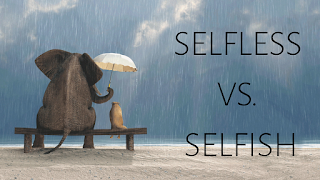Exploring the Dynamics: Selfless vs. Selfish Behavior in Human Interaction
Introduction:
Human behavior is a complex interplay of various factors, often influenced by individual motivations, societal norms, and personal values. At the heart of human interaction lie two contrasting traits: selflessness and selfishness. These characteristics shape our relationships, decisions, and ultimately, our place in society. In this article, we delve into the dynamics of selfless and selfish behavior, examining their manifestations, consequences, and underlying psychological mechanisms.
Understanding Selflessness: Selflessness is characterized by altruism, empathy, and concern for others' well-being above one's own interests. Selfless individuals often prioritize the needs of others, willingly offering their time, resources, and support without expecting anything in return. Acts of kindness, generosity, and compassion epitomize selfless behavior, fostering deeper connections and a sense of community.
Selflessness goes beyond mere actions; it reflects a mindset rooted in empathy and genuine care for others. Selfless individuals derive fulfillment from making a positive impact on others' lives, finding joy in selflessly giving without seeking recognition or reward. Their altruistic nature contributes to building trust, fostering cooperation, and nurturing meaningful relationships, ultimately enriching both their lives and the lives of those around them.
The Virtue of Selfishness: On the other end of the spectrum lies selfishness, characterized by a focus on one's own needs, desires, and interests at the expense of others. Selfish individuals prioritize personal gain and gratification, often disregarding the feelings and well-being of others in pursuit of their own goals. This mindset can manifest in various forms, from subtle acts of self-centeredness to more overt displays of manipulation and exploitation.
Selfish behavior is driven by a sense of entitlement and a lack of consideration for the consequences of one's actions on others. While selfish individuals may experience temporary satisfaction from fulfilling their own desires, their relationships are often marred by distrust, resentment, and instability. The pursuit of self-interest at the expense of others can lead to alienation, isolation, and a shallow sense of fulfillment, ultimately detracting from overall well-being.
The Interplay of Selflessness and Selfishness: Human behavior is rarely black and white, and the dichotomy between selflessness and selfishness is no exception. In reality, most individuals exhibit a blend of both traits, navigating a delicate balance between their own needs and the needs of others. Context, upbringing, and life experiences shape our propensity for selflessness or selfishness, influencing our behavior in different situations.
Moreover, the motivations behind seemingly selfless or selfish actions can vary widely. While some acts of selflessness may stem from genuine empathy and compassion, others may be driven by social expectations, guilt, or a desire for validation. Similarly, selfish behavior may arise from self-preservation instincts or past traumas, rather than inherent malevolence.
The Challenge of Cultivating Selflessness: In a world often driven by competition and individualism, cultivating selflessness can be a challenging endeavor. However, fostering empathy, compassion, and a sense of interconnectedness is crucial for building resilient communities and addressing societal challenges. Encouraging acts of kindness, promoting altruistic values, and cultivating a culture of reciprocity can help nurture a more compassionate and inclusive society.
Moreover, practicing self-care and setting healthy boundaries are essential components of selflessness. Recognizing the importance of one's own well-being enables individuals to better support others without sacrificing their own needs and values. By striking a balance between selflessness and self-interest, individuals can lead more fulfilling lives and contribute positively to the world around them.
Conclusion: Selflessness and selfishness represent two fundamental aspects of human nature, each with its own implications for personal relationships, societal dynamics, and individual well-being. While selflessness fosters empathy, connection, and community, selfishness can breed distrust, isolation, and conflict. However, the line between the two is often blurred, and individuals navigate a complex interplay of motivations and values in their interactions with others.
Ultimately, fostering a culture of empathy, compassion, and reciprocity is essential for promoting greater harmony and understanding in society. By cultivating selflessness and balancing it with self-interest, individuals can forge deeper connections, build stronger communities, and contribute to a more equitable and compassionate world.

.jpg)


Comments
Post a Comment